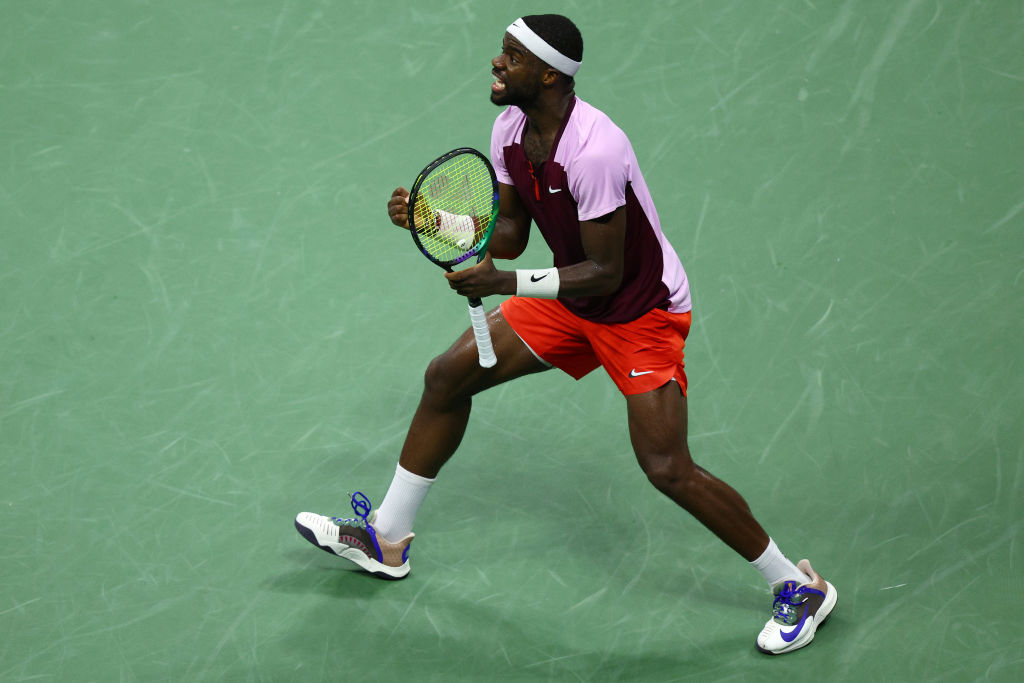FLUSHING, N.Y. — At 2-1 in the first set of his U.S. Open semifinal, Frances Tiafoe said he locked eyes with Michelle Obama. He suspects that he shanked a return right after. "Yeah, she thinks I'm a bum, can't make a return," he joked, right after wrapping up the "craziest two weeks" of his life, weeks that dramatically raised both his public profile and (if you dare) his ceiling as a tennis player. This torrid run at the Open altered not only Mrs. Obama's perception of Tiafoe—"seen her before, but [today's] a little bit different circumstance, she sees me and she's actually excited to see me," he joked—but also possibly Tiafoe's perception of Tiafoe. Early on in this Open he said that he was happy not be one of the designated big dogs in his age group, who vie for the No. 1 ranking, get the splashy court assignments, and feel all the pressure. Frances preferred to lay low and entertain: "I’m kind of Court 17, get some cheeky wins," as he put it. But after his five-set, heart-palpitating semifinal loss to Carlos Alcaraz on Friday night, Tiafoe was offered the rare loser's mic, and he used it to strike a very different tone: "I'm gonna come back and I will win this thing—I'm sorry guys."
We love you, @FTiafoe 💙 pic.twitter.com/mH966361tk
— US Open Tennis (@usopen) September 10, 2022
Total self-actualization doesn't typically occur over the course of two weeks, but pro athletes are lucky that way. Tiafoe actually revealed in his post-match presser that he had arrived at the Open with the intention to win it, and I understand that every pro athlete must think like that on some level in order to do their job, but from the outside, that vision was far-fetched. The world No. 26 had been churning through a solid but unspectacular season. He hadn't proven that he was capable of keeping up with the elite for this many matches in a row. I've enjoyed him even as I wasn't sure he'd ever prove that. No matter his results, I've religiously watched the 24-year-old, owing in equal parts to his athletic tools, offbeat technique, and personal magnetism. Throughout the first act of his career, he could only promise the following: toothsome highlights, the occasional head-turning win, and several unfocused heartbreakers. Absent was the consistency to churn through the unglamorous wins. His pal, the fellow American player Jessica Pegula, nailed the dynamic this week in press. "I'm always kind of on him: ‘Can you win a match, like, normal and not be like this whole theatrical event?’ I always give him crap," she said.
The Tiafoe of this U.S. Open blended business and pleasure. He got through his first three rounds with no fuss, knocking down all comers—including the diminutive baseline demon Diego Schwartzman—in straight sets, and averaging roughly an hour per set. He had his thrills, but also conserved his energy, which had to have worked in his favor as he advanced deeper into a major than he's ever been before. His fourth-round upset of Rafael Nadal was perhaps more a mental test than it was a physical one. Even though it wasn't peak Rafa, Rafa of any level is thorough enough to demand an excruciating degree of focus and execution from any usurper. Mid-court forehands that would've been shanks three years ago were now confident winners. Even more impressive was Tiafoe's clear-eyed straight-set win over Andrey Rublev, making it two years in a row that he's taken out the hard-hitting Russian, this year more straightforwardly than the last. Tiafoe's dream run stopped at Alcaraz, but then, many a tennis player over the next two decades is going to discover that his dream run stops at Carlos Alcaraz. There is no shame in that, and in fact plenty of glory in reaching a fifth set while the 19-year-old updated my "best shots I've ever seen" list on a near-nightly basis. These two are dynamic enough movers to set a frenetic new standard for cat-and-mouse points, and I hope they meet a dozen more times:
Though the results at this Open were startling, the groundwork has been laid down for some time now, according to coach Wayne Ferreira, who said he's drawn on his own experience as "relatively talented but lazy player" in order to coach an immensely gifted player who had some goofy habits. It has been hilarious and charming to hear the particulars of Frances's professionalization, some of which feel dangerously relatable for a professional athlete. Coach previously talked about banishing Tiafoe's phone for training sessions, and making him run without music to build up his focus so that he can play these four-hour long matches. He also said that he slashed the munchies quota and added some rigor to the routine. "He liked a lot of candy and chocolate and cookies. He'd eat at unusual times. He missed breakfast a lot. Didn't really have a good set of times on how when to eat before matches, what to eat after matches," he said in press this week. And as he also pointed out, Tiafoe's glow-up required a more serious treatment of the one aspect of tennis that is entirely under his control: the serve.
While he still occasionally struggles with consistency, Tiafoe has recently unlocked power, serving gas throughout the tournament with a high of 138 mph. Considering that earlier in his career he was content to use his serve as a simple point-starter, this is a somewhat jarring and upside-altering development. "I don't think he's ever had that in his head that it's worth anything. He's always been one to just slide the ball in," said Ferreira. "So we're working very hard on him banging the serve as hard as he can." In his match against Alcaraz, his first serve served him well in isolated instances, but also abandoned him for entire sets, making it all the more miraculous that he managed to hang in as long as he did. Tiafoe has gotten in just a hair under 60 percent of his first serves over the course of this season, and his coach said that if they can nudge that number into the mid-60s, where a lot of top players stand, or low-70s, a more rarefied threshold, it would change Tiafoe's trajectory altogether.
Perhaps as a testament to his serving chops, Tiafoe appeared in and won eight tiebreaks during this fortnight, the longest perfect record in any U.S. Open run, beating Pete Sampras's 7-0 in 2000. That's a neat factoid, but it also has me thinking some ominous thoughts about a potential misinterpretation of Frances Tiafoe's talent. What if, after writing six years of devoted blog posts championing this son of immigrants as a distinctly charismatic break from the last generation of American men's tennis, I must now watch him follow an inexorable destiny and assimilate into that national identity—the big-serving tiebreak king? Whatever, I'll still take it, and all the sevens in his scorelines to come. This kid rules.






